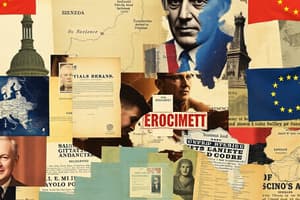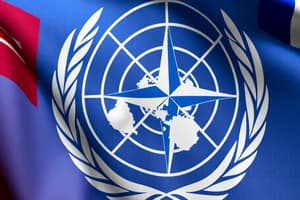Podcast
Questions and Answers
What does NATO stand for?
What does NATO stand for?
North Atlantic Treaty Organization
What is the main purpose of NATO?
What is the main purpose of NATO?
To safeguard the freedom and security of its member countries through political and military means.
What countries are involved in NORAD?
What countries are involved in NORAD?
The United States and Canada
What is the main goal of NORAD?
What is the main goal of NORAD?
Which of the following are examples of multilateral agreements?
Which of the following are examples of multilateral agreements?
What does the term 'peacekeeping' typically involve?
What does the term 'peacekeeping' typically involve?
Peacemaking involves deploying troops to monitor ceasefires.
Peacemaking involves deploying troops to monitor ceasefires.
Which of these describes a 'bilateral' agreement?
Which of these describes a 'bilateral' agreement?
Unilateralism involves a nation refusing to work with other nations in its foreign affairs.
Unilateralism involves a nation refusing to work with other nations in its foreign affairs.
What is the central focus of humanitarianism?
What is the central focus of humanitarianism?
Which of these describes a 'hegemonic internationalism'?
Which of these describes a 'hegemonic internationalism'?
What year was the World Trade Organization (WTO) established?
What year was the World Trade Organization (WTO) established?
What is the main goal of the International Monetary Fund (IMF)?
What is the main goal of the International Monetary Fund (IMF)?
What was NAFTA's primary objective?
What was NAFTA's primary objective?
What year was the European Union (EU) formally established?
What year was the European Union (EU) formally established?
The United Nations (UN) is a governmental organization with direct authority over all member countries.
The United Nations (UN) is a governmental organization with direct authority over all member countries.
What is one of the main criticisms of the United Nations?
What is one of the main criticisms of the United Nations?
What does the term 'isolationism' refer to?
What does the term 'isolationism' refer to?
What is the primary role of the United Nations Environment Programme (UNEP)?
What is the primary role of the United Nations Environment Programme (UNEP)?
What is the main goal of the United Nations Development Programme (UNDP)?
What is the main goal of the United Nations Development Programme (UNDP)?
What are the primary areas of focus for UNESCO?
What are the primary areas of focus for UNESCO?
Arctic sovereignty is a relatively unimportant issue in the 21st century.
Arctic sovereignty is a relatively unimportant issue in the 21st century.
What is one of the main reasons Arctic sovereignty is a growing concern?
What is one of the main reasons Arctic sovereignty is a growing concern?
What is the primary purpose of the Paris Agreement?
What is the primary purpose of the Paris Agreement?
Which of these is NOT a primary purpose of the IMF?
Which of these is NOT a primary purpose of the IMF?
The USMCA replaced NAFTA in 2020.
The USMCA replaced NAFTA in 2020.
Flashcards
NATO
NATO
A military alliance established in 1949 by the North Atlantic Treaty to ensure collective security against aggression. Its primary purpose is to safeguard the freedom and security of its member countries through political and military means.
NORAD
NORAD
A bi-national organization between the United States and Canada that provides aerospace warning, air sovereignty, and defense for North America. Established in 1958.
Multilateral Agreements
Multilateral Agreements
Treaties or agreements involving three or more countries to address issues of mutual interest, such as trade, environmental protection, or security. Examples include the Paris Agreement and the World Trade Organization.
Peacemaking
Peacemaking
Signup and view all the flashcards
Peacekeeping
Peacekeeping
Signup and view all the flashcards
Bilateral
Bilateral
Signup and view all the flashcards
Unilateral
Unilateral
Signup and view all the flashcards
Humanitarianism
Humanitarianism
Signup and view all the flashcards
Hegemonic Internationalism
Hegemonic Internationalism
Signup and view all the flashcards
World Trade Organization (WTO)
World Trade Organization (WTO)
Signup and view all the flashcards
IMF (International Monetary Fund)
IMF (International Monetary Fund)
Signup and view all the flashcards
NAFTA (North American Free Trade Agreement)
NAFTA (North American Free Trade Agreement)
Signup and view all the flashcards
European Union (EU)
European Union (EU)
Signup and view all the flashcards
United Nations (UN)
United Nations (UN)
Signup and view all the flashcards
Isolationism
Isolationism
Signup and view all the flashcards
UNEP (United Nations Environment Programme)
UNEP (United Nations Environment Programme)
Signup and view all the flashcards
UNDP (United Nations Development Programme)
UNDP (United Nations Development Programme)
Signup and view all the flashcards
UNESCO (United Nations Educational, Scientific and Cultural Organization)
UNESCO (United Nations Educational, Scientific and Cultural Organization)
Signup and view all the flashcards
Arctic Sovereignty
Arctic Sovereignty
Signup and view all the flashcards
Study Notes
NATO (North Atlantic Treaty Organization)
- Formed in 1949.
- A military alliance focused on collective security.
- Aims to protect member nations through political and military means.
NORAD (North American Aerospace Defense Command)
- Established in 1958.
- A U.S.-Canada partnership.
- Provides aerospace warning and defense for North America.
Multilateral Agreements
- Involve three or more countries.
- Address shared interests like trade, security, and environmental protection.
- Examples are the Paris Agreement and WTO.
Peacemaking vs. Peacekeeping
- Peacemaking : Negotiations to end conflicts.
- Peacekeeping : Deployment of forces to maintain peace after conflict. Monitor ceasefires and agreements.
Bilateral
- Agreements or relationships between two countries.
Unilateral
- A country acting independently in foreign affairs, without involving others.
Humanitarianism
- Focuses on human welfare and social reform.
- Provides aid to alleviate suffering.
Hegemonic Internationalism
- A global order led by one dominant power.
- Influences and controls political, economic, and cultural systems.
World Trade Organization (WTO)
- Formed in 1995.
- Enforces trade agreements, reduces barriers, and resolves trade disputes.
IMF (International Monetary Fund)
- Established in 1944.
- Promotes global monetary cooperation.
- Provides financial stability and loans to struggling countries.
NAFTA (North American Free Trade Agreement)
- Agreement between the U.S., Canada, and Mexico.
- Eliminated trade barriers from 1994 to 2020.
- Replaced by USMCA.
European Union (EU)
- A political and economic union of 27 European countries.
- Established by Maastricht Treaty in 1993.
- Common policies on trade, laws, and human rights.
United Nations (UN)
- Promotes peace, cooperation, and humanitarian aid.
- Addresses global issues like climate change.
- Criticized for bureaucracy and difficulty enforcing resolutions.
Isolationism
- Minimizes involvement in international affairs.
- Focuses on domestic concerns and avoids alliances or conflicts.
UNEP (United Nations Environment Programme)
- Coordinates global environmental efforts.
- Addresses issues like climate change and sustainability.
UNDP (United Nations Development Programme)
- Works to eradicate poverty and encourage sustainable development.
UNESCO (United Nations Educational, Scientific and Cultural Organization)
- Promotes global cooperation on education, science, culture, and communication.
- Fosters peace and human development.
Arctic Sovereignty
- The rights and claims of Arctic countries (Canada, Russia, U.S.).
- Governs territories and resources, crucial due to melting ice caps.
Studying That Suits You
Use AI to generate personalized quizzes and flashcards to suit your learning preferences.



